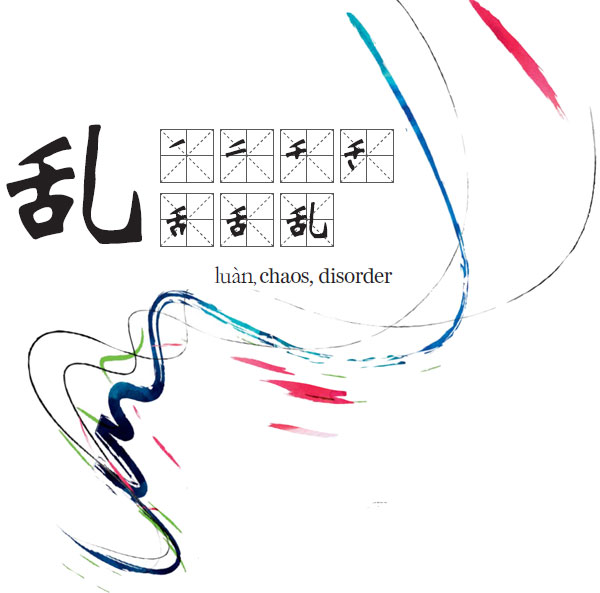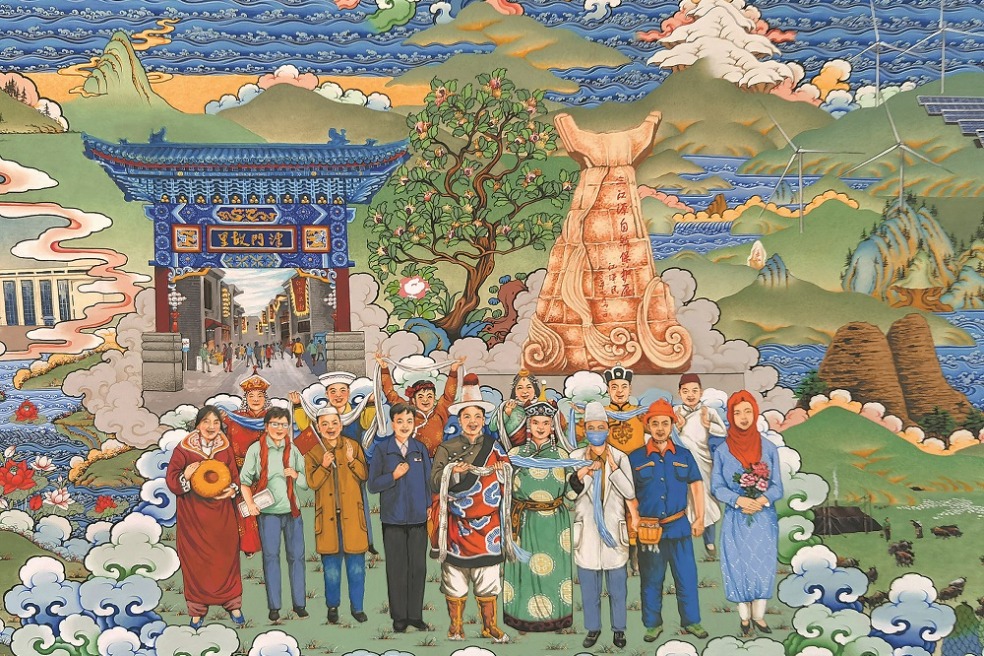Finding order in chaos

The character that instantly tells you it's all gone wrong - or has it?
It could be a harrowing tourist attraction in China or abroad during an annual national holiday, or a messy, crowded, rage-filled road in Beijing. It could even be the world inside your head.
Frankly, 乱 (luàn) can be used to describe any scene of chaos or disorder, even something as simple as a tangled clump of string.


Yet the character does not always refer to turmoil. Its earliest form was discovered among scripts inscribed on bronze vessels and actually meant the opposite.
The top and bottom of the character were formed by two pictograms representing two hands, with a bundle of silk threads hanging from a rack in the middle. Together, it was supposed to be the gesture of sorting silk threads. Later, on the right side of the character, a curved radical was added to represent the end result of this activity: neatly separated threads.
Therefore, the original meaning of 乱 was actually to impose order. But entropy took hold as the "disorder" interpretation eventually gained the upper hand in the Chinese language. The traditional form - 亂 - also gave way to the simplified version.
Throughout Chinese history, dynasties have risen and fallen. So 乱 was commonly associated with the instability and disorder of states. Confucius warned: "Do not enter a dangerous state, and do not reside in a chaotic one." (危邦不入,乱邦不居; wēi bāng bù rù, luàn bāng bù jū.) This does not just refer to the obvious choice for personal safety; it is a message to the politically minded to lay low until the situation cools down.
Interestingly, an idiom also states that heroes rise in turbulent times (乱世出英雄; luàn shì chū yīng xióng), so you can either take the scholar's advice and mind your business or try your luck at being a hero.
One quote from Lyushi Chunqiu (吕氏春秋, literally Lyu's Annals), a collection of political essays compiled around the 3rd century, states: "To administer a state without law will lead to chaos; but abiding by the law without reform will also cause rebellion. With chaos and rebellion, a state can't possibly be prosperous." (治国无法则乱,守法而弗变则悖,悖乱不可以持国; zhì guó wú fǎ zé luàn, shǒu fǎ ér fú biàn zé bèi, bèi luàn bù kě yǐ chí guó.)
Today, we use 乱 to describe anything from a messy house to a restless mind. For instance, my home is a mess, and my mind is a mess (家里乱糟糟的,心里也乱糟糟的; jiā lǐ luàn zāo zāo de, xīn lǐ yě luàn zāo zāo de).
A number of words formed by the character all have similar meanings, such as 紊乱 (wěn luàn; chaos or disorder), 凌乱 (líng luàn; in disorder or in confusion), and 乱套 (luàn tào; to mess something up).
A phrase often used to describe a state of disorder is 乱七八糟 (luàn qī bā zāo; literally the messy seven and eight). For example, 现在公司里乱七八糟,大家心里也都乱七八糟 means the company is in a mess, and everyone's mind is a mess.
You might be wondering what seven and eight have to do with disorder. They refer to chaotic periods in Chinese history. First, there are the seven states that rose in rebellion against the emperor in the Western Han Dynasty (206 BC-AD 24), and second there are the eight princes who played a part in a 16-year power struggle during the Western and Eastern Jin dynasties (265-420).
An unsettled mind is something we all experience. We just can not help letting our mind run wild (胡思乱想; hú sī luàn xiǎng) from time to time, or perhaps your brain feels like a tangled web of yarn (心乱如麻; xīn luàn rú má), or in restless distress or disquiet (心烦意乱; xīn fán yì luàn) about even small details.
Whenever you see 乱, you know something is out of place. The character can also mean random or arbitrary. For example, when people share an opinion without thinking, you can call it 乱说 (luàn shuō, talking nonsense), or when someone offers you offhand advice, it is 乱出主意 (luàn chū zhǔ yì).
One interesting phrase to remember is 乱弹琴 (luàn tán qín, literally randomly playing the lute), which means to act or talk foolishly. For instance, you have 最忙的时候,你要去度假, 真是乱弹琴 (zuì máng de shí hòu, nǐ yào qù dù jià, zhēn shì luàn tán qín; at this busy time you want to take a vacation; it is fool's talk).
There are also a few cases where 乱 has other meanings far from its core purpose. For instance, in the phrase 以假乱真 (yǐ jiǎ luàn zhēn; passing off fake as genuine), 乱 is a verb and means to confuse. It also means to upset or spoil in the idiom 小不忍则乱大谋, which translates as temper or impatience can spoil a big plan.
In terms of relationships, 乱 can also refer to promiscuity, as in 淫乱 (yín luàn, licentious).
From turbulent states to the sensitive human mind, the character covers every scenario in which things go wrong. Here's hoping you stay out of 乱子 (luàn zi; trouble) in the near future - but let's face it, chaos is a law of nature.
Courtesy of The World of Chinese, www.theworldofchinese.com
The World of Chinese
(China Daily Africa Weekly 12/11/2015 page27)
Today's Top News
- Rise of macro-regions and dollar's decline
- Training helps to empower Global South
- Country to cut costs of preschool education
- Pakistani minister hails high-tech ties with China
- China-US trade ties key for world economy
- Prospering Xizang sees surge in overseas visitors






























